Tanya Horeck’s playlist, ‘Better Worlds’ contains serialised TV shows whose utopic visions are deceptively political as they offer ways of imagining and feeling possibilities and alternatives.
Better Worlds
In the nightly conversations I have with my youngest child regarding his distress and anxiety about the coronavirus, we always discuss the things we would like to do once we come out of lockdown (park with his friends for him; swimming, maybe the cinema, for me). I have similar conversations about life post-Covid-19 with adults but they are inevitably darker and less reassuring. One of the questions that has naturally surfaced during these weeks of lockdown concerns the lessons we are going to learn from all of this horror, the things we are going to do differently when – and if – we come through this. What kind of society do we want to live in? What changes will we make?
One thing is certain: Covid-19 has exposed pre-existing global social inequalities. Among the many hard and painful truths which have surfaced are that ethnic minorities are at a greater risk of death from the virus because of racial discrimination and inequities regarding healthcare; that the poor, the old, and the disabled are especially vulnerable during social distancing; and that, despite appearances of times-they-have-a-changed to the contrary, domestic and childcare duties are still deeply gendered activities. Meanwhile, the rich and famous hole away on their vast complexes, some adding insult to injury by posting cutesy social media clips in which they sing and dance for us. Tech companies are extending their domination as they take advantage of this moment in which we are helplessly tethered to our screens. Charlie Brooker has recently said that it is like the news is copying Black Mirror, his dystopian TV series that examines the darkness of new media technologies. The coronavirus has ‘stolen his nightmare fuel’, Brooker says.
But perhaps nightmare scenarios are not what we need to be watching right now. In the face of deadening despair, there is a comfort to be had from watching shows that offer us a vision of the world seen through rose-tinted glasses. My themed playlist, ‘Better Worlds’, revolves around serialised TV shows that offer utopian-like visions. To say that they are candy-coloured and optimistic is not, however, to dismiss them as apolitical. On the contrary, I contend that each of these shows, in their way, has something political to say to us about the world and our place within it. They offer a way of feeling and imagining otherwise.
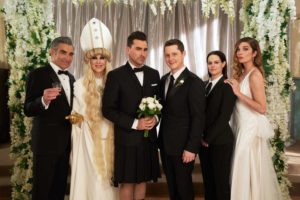 Schitt’s Creek (Daniel Levy, Eugene Levy, 2015-2020)
Schitt’s Creek (Daniel Levy, Eugene Levy, 2015-2020)
Schitt’s Creek is a Canadian television sitcom created by Daniel Levy, who also stars in the show alongside his father Eugene Levy, and actors Catherine O’Hara and Annie Russell. Plot wise, the comedy is about a rich family who lose all of their money and have to live together in two motel rooms in a small hick town. While the show is undeniably sweet, the witty comedy circumvents the potential for it be sickly so. It is hysterically funny with a stand-out performance from the divine O’Hara as Moira Rose, the former soap opera star turned Crow movie star, with a particularly distinctive accent (you can watch the one minute video of her saying the word bébé here: https://youtu.be/PCLxZyTCw1k). In response to the suggestion that the Schitt’s Creek sunny, rosy world in which homophobia or discrimination does not exist was ‘unrealistic’, Levy has said that he has no ‘patience for homophobia’ and that he deliberately took that out of the equation to show ‘love and tolerance’ instead. There is a political bite to this determination to tell ‘queer stories that don’t end in tragedy’ and the show is rooted in a utopic world where its characters can thrive accordingly. The complete series is available to watch on Netflix.
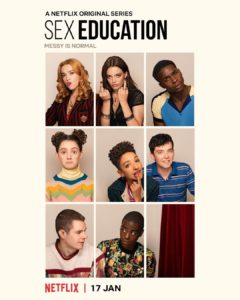 Sex Education (Laurie Nunn, 2019-)
Sex Education (Laurie Nunn, 2019-)
Netflix’s Sex Education is, as its creator Laurie Nunn suggests, a ‘frank but funny’ series about sex amongst a diverse group of teenagers set in a high school in an indeterminate location. That it was filmed in Wales but had American overtones and featured a range of accents raised ire among some viewers, but for me, the indeterminacy of location is crucial to its utopian overtones. Sex Education takes place in an idealized space of sexual exploration and honesty. What makes Sex Education such a culturally resistant, politically productive series, is that, while it explores serious issues such as sexual assault, it refuses to dwell on pain, darkness, and suffering. It exists in the space of what-should-be, where the possibilities for personal happiness, equality, and social justice are found in acts of connection, empathy, and solidarity. In short, Sex Education creates the world its young characters deserve. Sex Education is available to watch on Netflix.
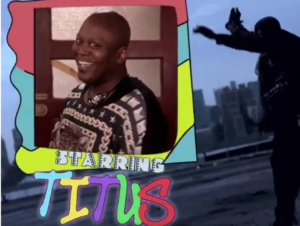
Unbreakable Kimmy Schmidt (Tina Fey, Robert Carlock, 2015-2019, 2020)
Created and produced by SNL alumni Tina Fey, Unbreakable Kimmy Schmidt is a comedy about a woman named Kimmy (Ellie Kemper) who moves to New York to begin life anew after she has been rescued from an underground bunker where she was held captive and sexually abused for 15 years by a sociopath that calls himself ‘The Reverend’ (Jon Hamm). The subversive bite of the series derives from the tension between what Julia Havas calls its ‘candy-coloured visual aesthetics’ and its sarcastic comedy and social commentary. Kimmy is an eternal optimistic and innocent who wills others to see the world through her eyes. As with all of the series on my playlist, the show is a strong example of ensemble cast television and Kimmy is ably supported on her adventures by her friends Titus Andromedon (Tituss Burgess), Lillian Kaushtup (Carol Kane) and Jacqueline Voorhees (Jane Krakowski). Netflix recently dropped an interactive ‘choose your own adventure’ special episode of Kimmy, which is silly fun but also interestingly well suited to quarantine life. Unbreakable Kimmy Schmidt, the interactive episode (Kimmy vs The Reverend), and the mockumentary Party Monster: Scratching the Surface (about The Reverend) are available on Netflix.
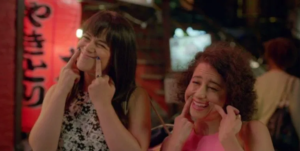 Broad City (Ilana Glazer, Abbi Jacobson, 2014-2019)
Broad City (Ilana Glazer, Abbi Jacobson, 2014-2019)
Fronted by American Jewish millennials Ilana Glazer and Abbi Jacobson, Broad City began as a web series before finding a home on Comedy Central where it ran for five glorious seasons. This raunchy, rowdy, anarchic comedy is about Abbi’s and Ilana’s lives in New York, as they smoke drugs, have sex with various people, and struggle with their minimum wage jobs. It’s not the stuff of romantic fantasy that’s for sure, and yet the show pulsates with a positive energy that revolves around the close-knit friendship between Abbi and Ilana. Watching the final episode of the fifth and final season in which Abbi and Ilana hold hands and run around New York, taking up space and causing trouble, it’s hard not to be slightly amazed by the joyous freedom of it all. It’s strangely prescient too: as they walk across the Brooklyn Bridge together, pushing a toilet they found on a sidewalk, Ilana ruminates on how Abbi’s impending move to Boulder, Colorado means they’ll be in different cities when the ‘apocalypse occurs’. Viewing the episode from the vantage point of lockdown, one is inevitably left imagining the craziness of Abbi and Ilana’s zoom calls. For all its gross-out gags along the way, what the show concludes with, finally, is a beautiful image of friendship outside the binds of heteronormativity; as Ilana tells Abby: this has been ‘the most beautiful, deep, real, cool-and-hot, meaningful, important relationship of my life.’ #abbyandilanaforever.
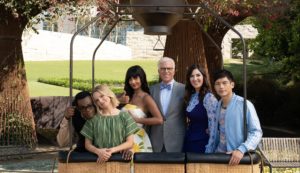 The Good Place (Michael Schur, 2016-2020)
The Good Place (Michael Schur, 2016-2020)
The Good Place is a show all about how to construct a better world. Showrunner Michael Schur specialises in feel-good visions of communities, including local government (Parks and Recreation see below) and the police (Brooklyn Nine-Nine). Clever and compelling, but also as hilarious as ‘fork’, The Good Place uses moral philosophy in inventive ways as it asks viewers to reflect on what it means to become a better person.
The Good Place is currently available on UK Netflix.
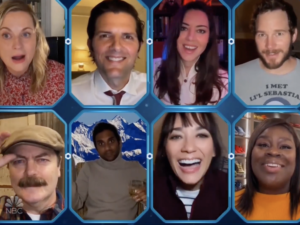
Parks and Recreation (Greg Daniels and Michael Schur, 2009-2015)
Parks and Recreation comes up repeatedly in recent lists of good ‘pandemic viewing’. Recognising its own value for the moment, the cast reassembled for a 30-minute coronavirus special in May, which raised 3 million dollars for Feeding America’s Covid-19 Relief Fund. This special episode sees the thoroughly decent and much-loved Leslie Knope (Amy Poehler), former Deputy Director of Pawnee Parks and Recreation Department, zoom call her former colleagues to check in with them during the pandemic.
Parks and Recreation is available to watch on Amazon, Google Play (rental), YouTube (rental) among other sites.
***
Tanya Horeck is a reader in Film, Media, and Culture at Anglia Ruskin University in Cambridge, England. She is author of the book Public Rape: Representing Violation in Fiction and Film and the newly released Justice on Demand: True Crime in the Digital Streaming Era.
***
About the lists: Calls to socially distance and self-isolate are driving people to look for things to watch. But the sheer amount of options out there can be overwhelming. For this reason, we at the Centre for Screen Cultures are producing themed playlists of film, video, and television so you can organise your own series or festival at home (or home school). They will update here and here: https://screenculture.wp.st-andrews.ac.uk/category/media-playlists/
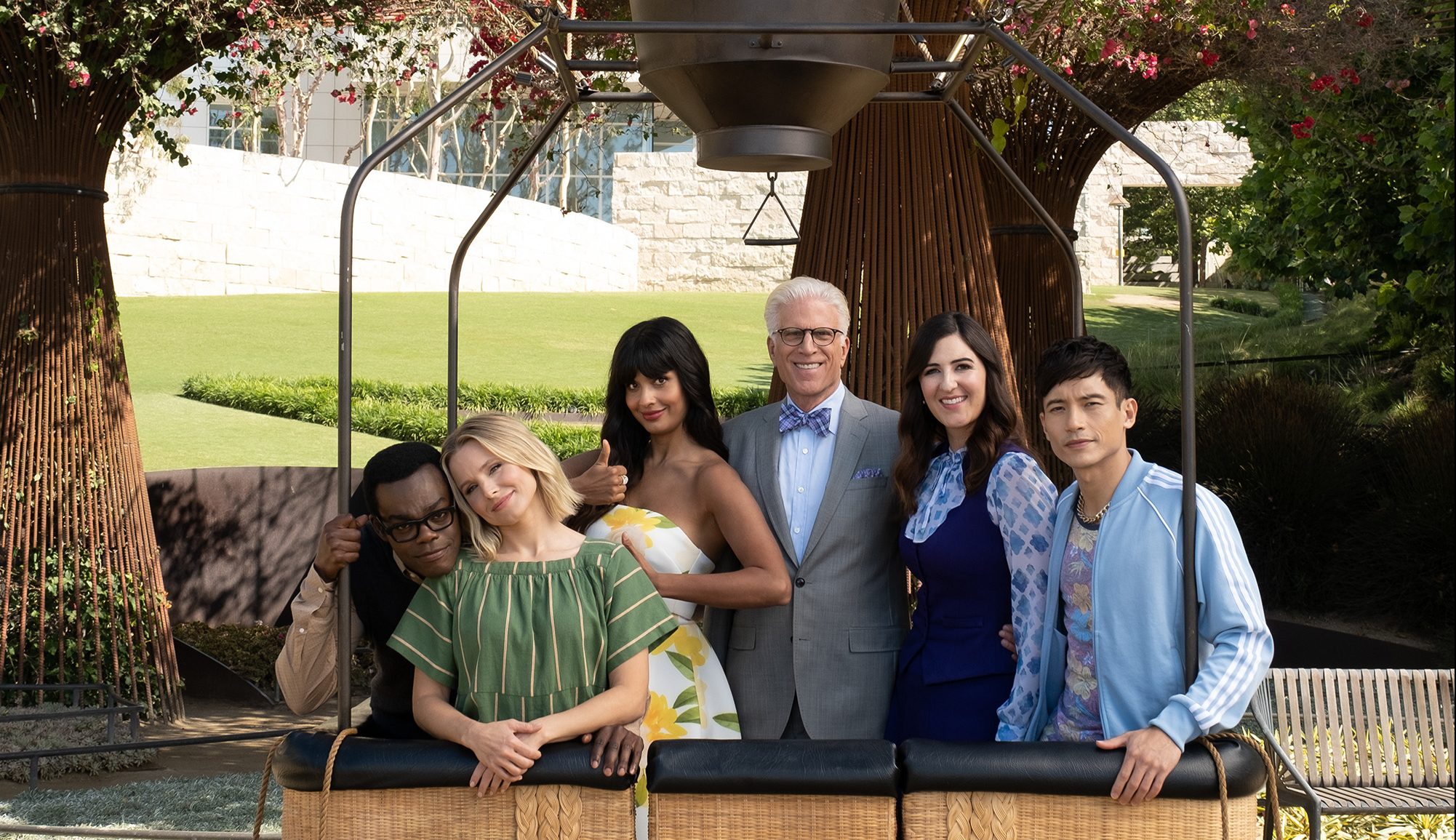
Thanks for this, I enjoyed it! I agree about ‘Sex Education’ in particular. This afternoon I was just discussing with my students how episode 7 of the second series re-signifies ‘girlpower’ in a feminist key.